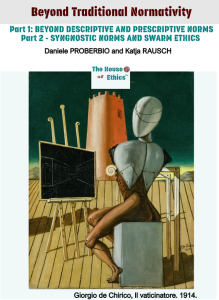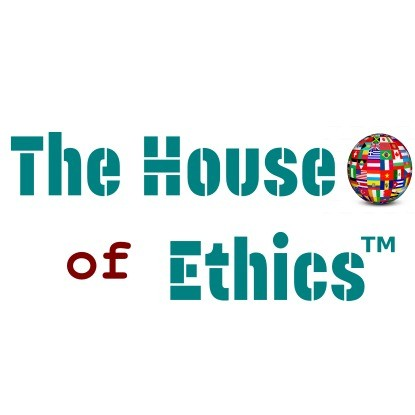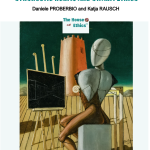BEYOND TRADITIONAL NORMATIVITY – Part 2
Beyond Traditional Normativity - Part 2
SYNGNOSTIC NORMS AND SWARM ETHICS
by Daniele PROVERBIO (1) and Katja RAUSCH (2)
(1) Researcher in complex systems at University of Trento and Director of Interdisciplinary Research at The House of Ethics
(2) Founder of The House of Ethics – katja.rausch@houseofethics.lu
Download pdf Part 2
In our first article of two, we have challenged traditional normativity and the linear perspective of classical Western ethics. In particular, we have concluded that the traditional bipolar category of descriptive and prescriptive norms needs to be augmented by a third category, syngnostic norms.
Building on the hook about the synergies of syngnostic norms and Swarm Ethics1, we here better clarify this novel concept, and suggest actionable alternatives to the traditional view. We will show how Swarm Ethics can help us make a step forward, as an ethical framework of emerging and systemic ethics, as opposed to hard-coded, cognitive traditional Western ethics.
SWARMS AND COLLECTIVE BEHAVIORS
Swarm Ethics builds on the concepts of “swarms”2. These are understood as collections of single individuals, able to perform complex tasks through self-organization. In its origin, the discipline of swarm intelligence was developed as a field of complex systems studying groups of natural or artificial entities3.
Recently, the idea of self-organizing societies4 and emerging social models inspired a synecdoche into “Swarm ethics”, to signify emerging ethics from interacting humans.
Swarms build on circularity, as they evolve according to the same interactions that are shaped by their evolution.
Swarm Ethics emerges from swarms in action. As they thrive dynamically, beholders may recognise common patterns and measure alignment of opinions and guiding principles.
Studying the “dispersion” of principles and “lifting” the most representative ones constitutes the starting point to construct ethical norms, defined post-hoc.
By feeding back this information into the swarm, such “ethical” principles skew the distribution of principles and become part of the set of underlying principles and values, driving swarms by providing interaction purposes and shaping goals and constraints.
This process goes beyond the exclusivity of normativity or the fuzziness of empiricism. An inclusive guiding principle of “act to maximize the inclusion into swarms” opens the breadth of potential swarming participants, by connecting the world.
Swarming networks become bigger, more heterogeneous and dynamic. Then, it brings an ever-changing intersection of values and principles.
More than relativism (where multiple ethical sets are recognised but remain separate, like oil and water), the modern era is characterized by mixing and intersecting boundaries (like pouring sugar into water and never separating them again). Globalization, world-wide travels and business, the Internet – it all concurs5.
Under this perspective, the participants of a collective swarm do not surrender their viewpoints or compromise their perspectives.
On the contrary, as syngnostic normativity adds perspectives, they offers new meaning in new contexts.
As syngnosticism is based on an inclusive and unifying belief system, syngnostic norms add a systemic and collective layer to normativity that lack both descriptive and prescriptive norms. Hence, syngostic norms bridge to and are explained by Swarm Ethics to effectively form a dynamic system of emergence, transmission and adoption of social and ethical norms.
Consequently, following Ullman-Margalit, “norms are, rather, the resultant of complex patterns of behaviour of a large number of people over a protracted period of time”6. Contrary to rules, norms do not emerge fully formed. “Logic appropriateness” or deontic logic are needed as underlined by James March and Johan Olsen (1989)7.
This is where Swarm Ethics acts as a catalyst to shaping emerging ethics and emerging norms by naturally gauging towards a mean of morals spurred by the power of swarm intelligence.
In hyperconnected, transgenerational open and mostly cyber-physical systems where the frequency and intensity of interactions are facilitated and multiplied (not added), the emergence, transmission and adoption of norms should be considered as a radically swift transformation8.
HOW SYSTEMIC SWARM ETHICS ACTS AS CATALYST TO SYNGNOSTIC NORMS
Social norms are part of a larger motivational system. They do not exist in isolation, but rather form systems of complementary and competing pressures on behaviour.
This approach coincides with Swarm Ethics principles, where people are no longer viewed as singletons but as integral parts of wider open hyperconnected systems.
Systems comprise not only social norms but other types of motives as well, including needs, goals, values, and material incentives; all of these forces act in concert to determine individual behaviour and collective intelligence.
Thus, the consequences of strengthening or weakening a particular norm depends on what other forces are operating within the system.
The traditional approach to normativity has always emphasized a dual individual internal cognitive functional and external structural level.
Our theory of novel syngostic norms adds a crucial layer to emergence, transmission and adoption of norms: the cyber-physical intersection (CPI).
It challenges the traditional idea of an absolute, consequential and latent norms process – similarly to how traditional cognitive ethics is challenged by Swarm Ethics. Polysensory catalysts9 and multiple intelligences of Swarm Ethics are keys to new syngnostic normativity.
We are building on recent discoveries. In 2017, research by Ho et al. has shown how moral norms develop and are transmitted through social interactions and relationships10. The interconnectedness of agents is crucial in psychological dynamics that occur within groups.
Mutuality, reciprocity and imitation are drivers for ethical and norm emergence. Tangney, Stuewig, & Mashek 11 go even as far as calling it moral emotions that influence compliance to norms.
Insofar, emotional experiences can sustain one’s own compliance with moral norms and motivate enforcement of norm compliance in others as shown by Dunning, Fetchenhauer, & Schlösser12. Consequently, this emphasizes the important role of self-regulation and individual responsibility as autonomous agents in a multi-agent system.
And we echo the pioneering cyberneticist Heinz von Foerster’s epistemology of the “ethical imperative” overcoming linear and traditional dualistic normative thinking and acting: “Always try to act so as to increase the number of choices.”13
Both ethics and normativity need to undergo a paradigm shift to stay effective and sustainable overtime and avoid being outpaced by overruling technological accelerations infiltrating society, business and people.
The systemic worldwide infiltration by generative AI is one such phenomenon shaking up social norms and ethics.
IN CONCLUSION
In pluri-cultural and cyber-physical networks, different classes of behavioural patterns and norms can arise. We might be at a tipping point to investigate and find alternatives to traditional normativity or ethical behaviours, bridging normativity with complex systems disciplines – like the behavioural economic games theory14 where individuals anticipate, infer, and act on what others do based on context (rules and norms) for decisions. The circularity then allows to embed recognised emerging norms back into their shaping for societies and business, naturally synchronizing with non-linear polysensory social and ethical interplays and creating new patterns of social and ethical behaviour.
In cyber-physical times, normative and ethical frameworks have become progressively extensible. Norms are both cause and effect, a source of their own perpetuation and implosion.
The systemic approach to emerging ethics as a powerful perspective and purpose generator for collective, decentralized and agile ethics might prove an innovative thinking and acting framework to develop normativity in the digital age by adopting syngnostic norms.
They will incentivise the democratic value of integration, progress and participative power of shapable norms, benefiting from collective and decentralized Swarm Ethics, an emerging ethics from people, by people and for people to iron out and reformulate the angularity of normative concepts.

1 Rausch, Katja and Proverbio, Daniele. “Swarm Ethics: A new Collective and Decentralized Purpose-Driven Ethics in the Digital Age”, House of Ethics (2022). https://www.houseofethics.lu/2022/09/23/from-swarm-intelligence-to-swarm-ethics-a-new-collective-purpose-driven-ethics/
2 Proverbio, Daniele. “Ethics in the Swarm: self-coordinating opinions and emergence”. Swarm Ethics (2023)
3 Kennedy, James. “Swarm intelligence.” Handbook of nature-inspired and innovative computing: integrating classical models with emerging technologies. Boston, MA: Springer US, 2006. 187-219.
4 Helbing, Dirk, “Social self-organization: Agent-based simulations and experiments to study emergent social behaviour”. Springer, 2012.
5 Percacci and Vespignani. “Scale-free behaviour of the Internet global performance.” The European Physical Journal 32 (2003): 411-414.
6 Ullman-Margalit, “The Emergence of Norms”, Oxford University Press (1977).
7 March, James G., and Johan P. Olsen. “The institutional dynamics of international political orders.” International organization 52.4 (1998): 943-969.
8 Labov, William. “Transmission and diffusion.” Language 83.2 (2007): 344-387..
9 Rausch, Katja and Proverbio, Daniele. “Swarm Ethics: A new Collective and Decentralized Purpose-Driven Ethics in the Digital Age”, House of Ethics (2022).
10 Ho, Mark K., et al. “Social is special: A normative framework for teaching with and learning from evaluative feedback.” Cognition 167 (2017): 91-106.
11 Tangney, June Price, Jeff Stuewig, and Debra J. Mashek. “Moral emotions and moral behaviour.” Annu. Rev. Psychol. 58 (2007): 345-372.
12 Dunning, David, Detlef Fetchenhauer, and Thomas M. Schlösser. “Trust as a social and emotional act: Noneconomic considerations in trust behaviour.” Journal of Economic Psychology 33.3 (2012): 686-694.
13 von Foerster, Heinz. “Ethics and second-order cybernetics”, in Understanding Understanding: essays on cybernetics and cognition, New York, Springer, ([1991] 2003).
14 Von Neumann J. Morgenstern O., “Theory of games and economic behaviour”. Princeton, NJ: Princeton University Press (1945).





